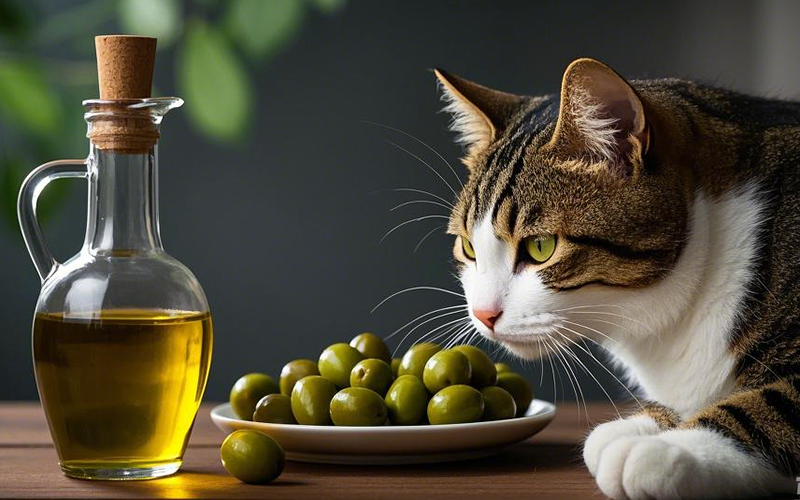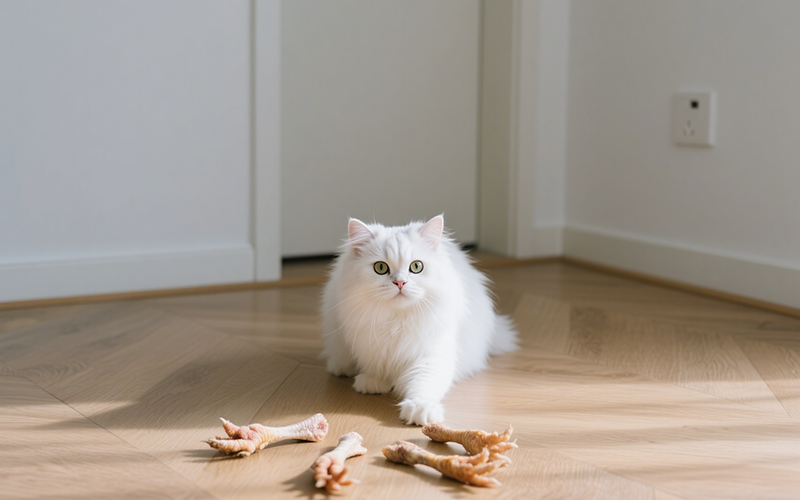Can Cats Eat Olive Oil? Is It Safe or Harmful?
- 3 Mar 2025 10:39
Yes, cats can eat olive oil in small amounts, and it can even provide some health benefits. Olive oil is rich in healthy fats and contains antioxidants that may support your cat’s overall health. However, like anything, moderation is key. Too much olive oil can lead to weight gain and digestive upset.

Health Benefits of Olive Oil for Cats
✅ Rich in Healthy Fats – Olive oil contains monounsaturated fats, which are beneficial for coat health and can help maintain skin moisture.
✅ Supports Digestive Health – A small amount of olive oil may help lubricate the intestines, easing constipation or promoting smoother digestion.
✅ Anti-Inflammatory Properties – Olive oil is high in antioxidants that can reduce inflammation and support overall health, especially in aging cats.
✅ Improves Coat Condition – Regular use in moderation can help improve your cat’s fur texture, making it shinier and softer.
Potential Risks of Olive Oil for Cats
⚠ High-Calorie Content – Olive oil is high in calories, and too much can lead to obesity if not carefully monitored.
⚠ Digestive Upset – Overconsumption may cause diarrhea, vomiting, or an upset stomach in some cats.
⚠ Not a Substitute for a Balanced Diet – Olive oil should only be used as an occasional supplement, not as a substitute for a well-balanced cat food.
How to Safely Give Olive Oil to Your Cat
🐾 Small Amounts Only – A few drops of olive oil (about 1/4 teaspoon) per meal is plenty for most cats.
🐾 Mix with Food – You can drizzle it over their food, or even mix it with their regular meal to make it more palatable.
🐾 Monitor for Allergic Reactions – While rare, some cats may have a mild allergic reaction to olive oil. Watch for symptoms like itching, rash, or digestive upset.
How Much Olive Oil Can Cats Eat?
🐶 Small Cats (Under 10 lbs) – ¼ teaspoon per meal.
🐱 Larger Cats (Over 10 lbs) – Up to ½ teaspoon per meal.
It’s important to not exceed these amounts to avoid potential weight gain or digestive problems.
Final Verdict: Can Cats Eat Olive Oil?
✅ Yes, in moderation. Olive oil can be beneficial for your cat’s health, particularly for their coat and digestion, but it should only be given occasionally and in small amounts. Always monitor your cat’s response and ensure it is part of a balanced diet.
For more pet health tips and personalized advice, try PettureX, the AI-powered pet assistant offering 24/7 online consultations and pet image recognition to keep your cat happy and healthy!
Related

Can Cats Eat Egg Yolk Raw? A Vet's In-Depth Guide to Feline Nutrition & Safety
- 10 Jun 2025
Can Cats Eat Dog Kibble? Unpacking the Nutritional Mismatch!
- 29 May 2025
Can Cats Eat Deli Turkey? Slicing Through the Facts for Your Feline!
- 29 May 2025
Can Cats Eat Deer Meat? Exploring Venison for Your Feline!
- 28 May 2025
Can Cats Eat Corned Beef? Unpacking This Salty Human Delicacy!
- 28 May 2025
Can Cats Eat Cooked Rice? The Grain Truth for Your Feline Friend!
- 27 May 2025
Can Cats Eat Cornbread? A Crumb of Truth for Curious Cat Owners!
- 27 May 2025
Can Cats Eat Cooked Meat? Sizzling Facts for Your Feline's Feast!
- 26 May 2025
Can Cats Eat Chili? Spicing Up the Truth About This Human Dish!
- 26 May 2025
Can Cats Eat Chicken Feet? A Paw-sitive or Negative Treat?
- 24 May 2025
